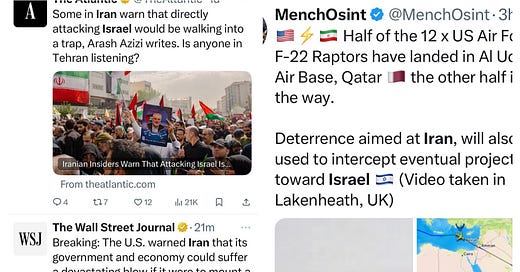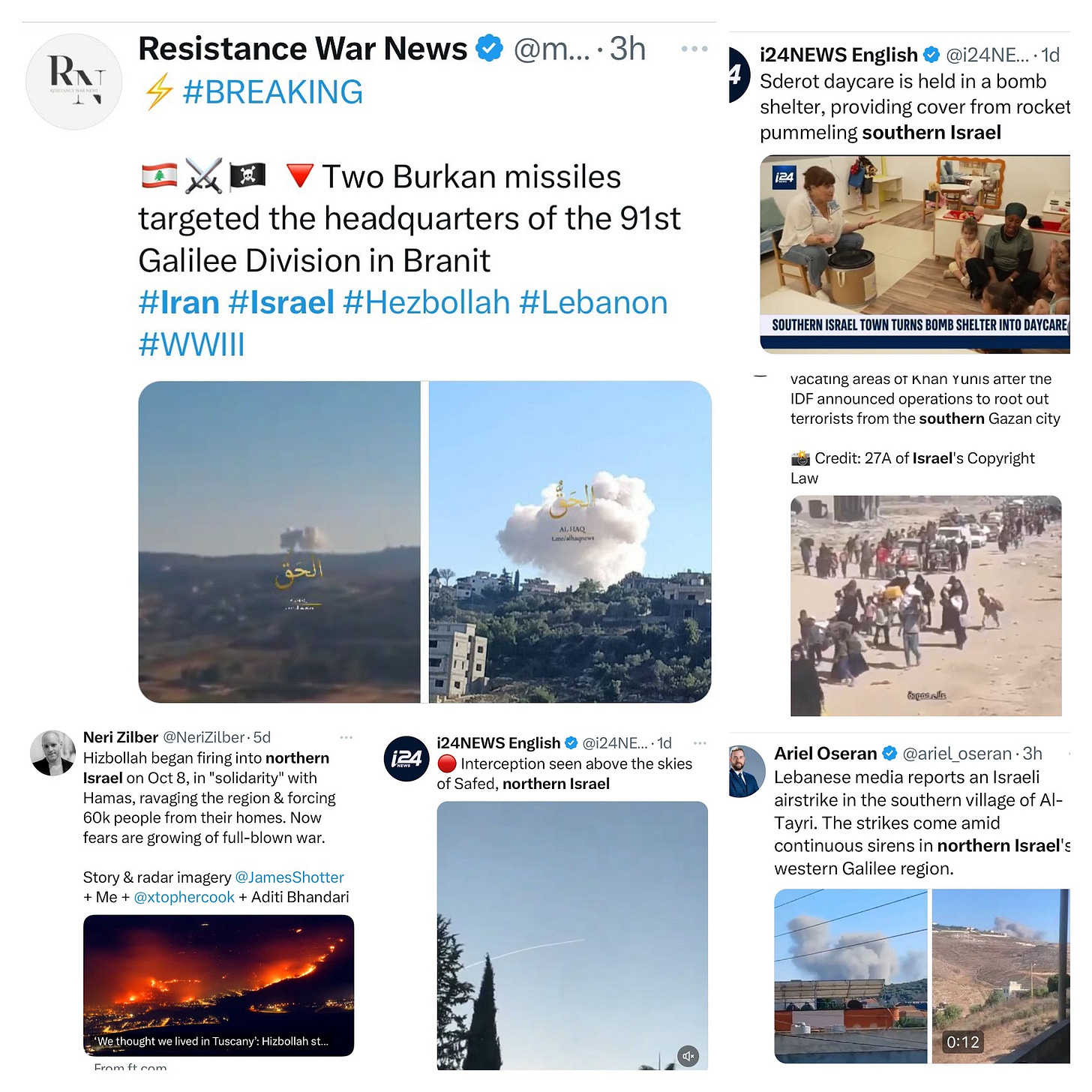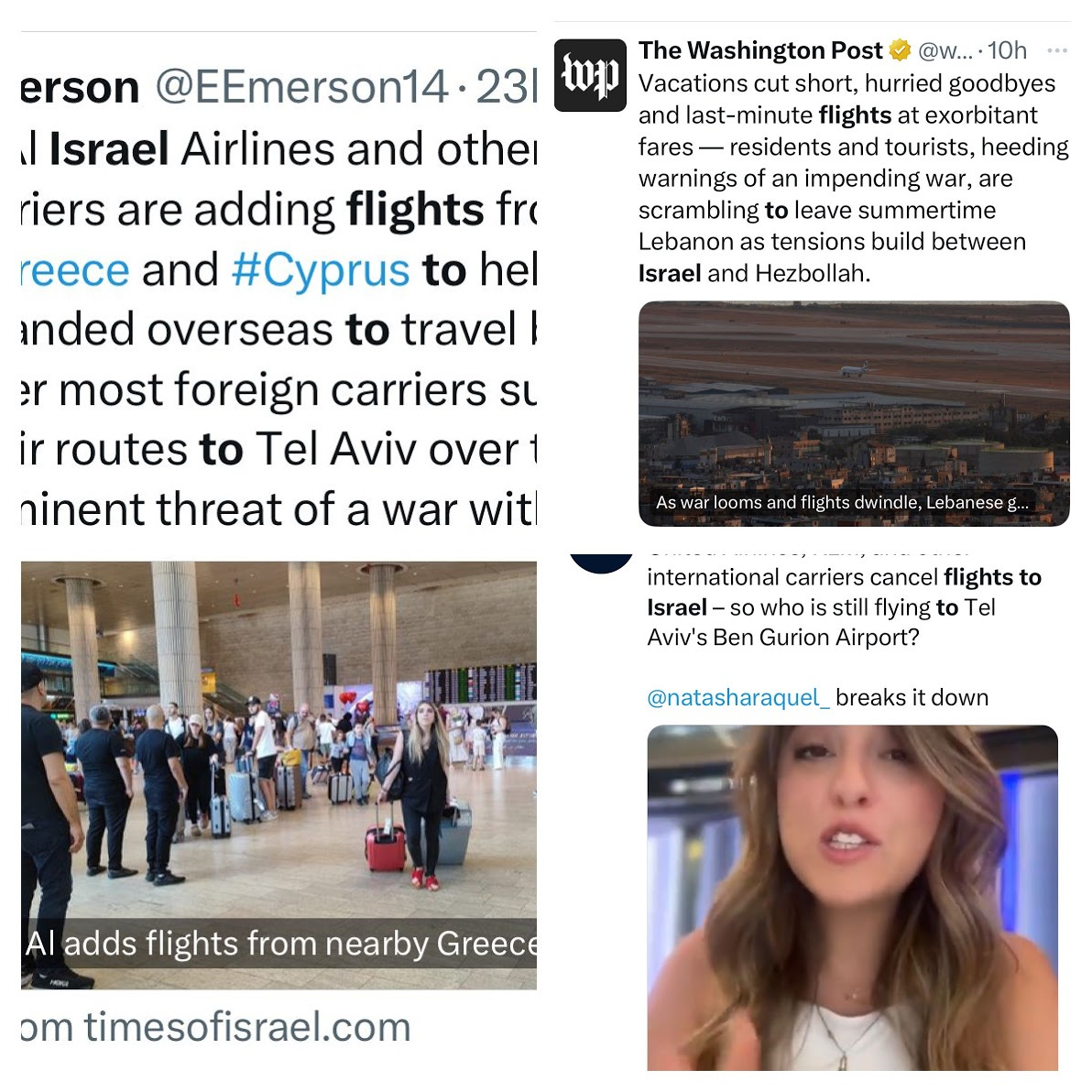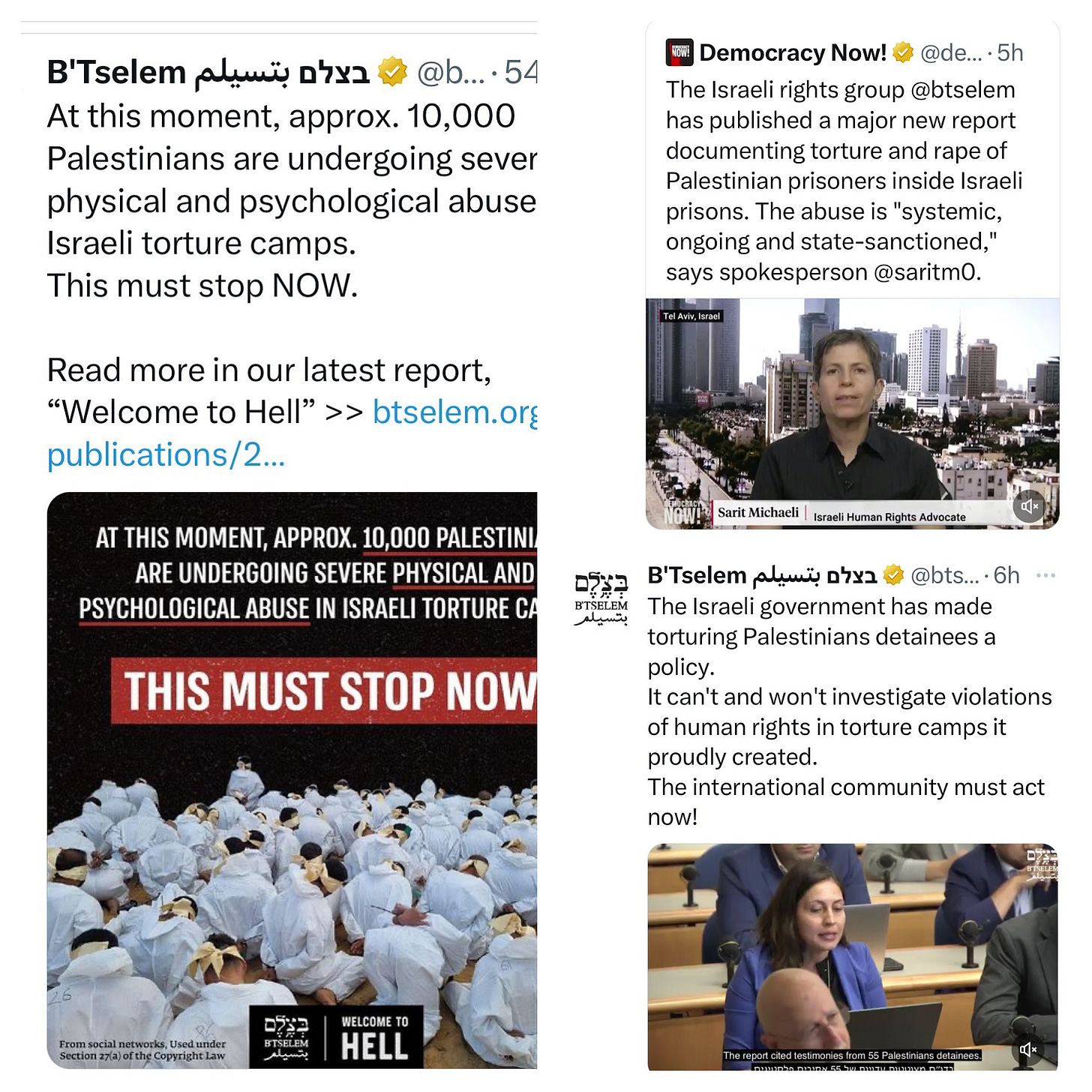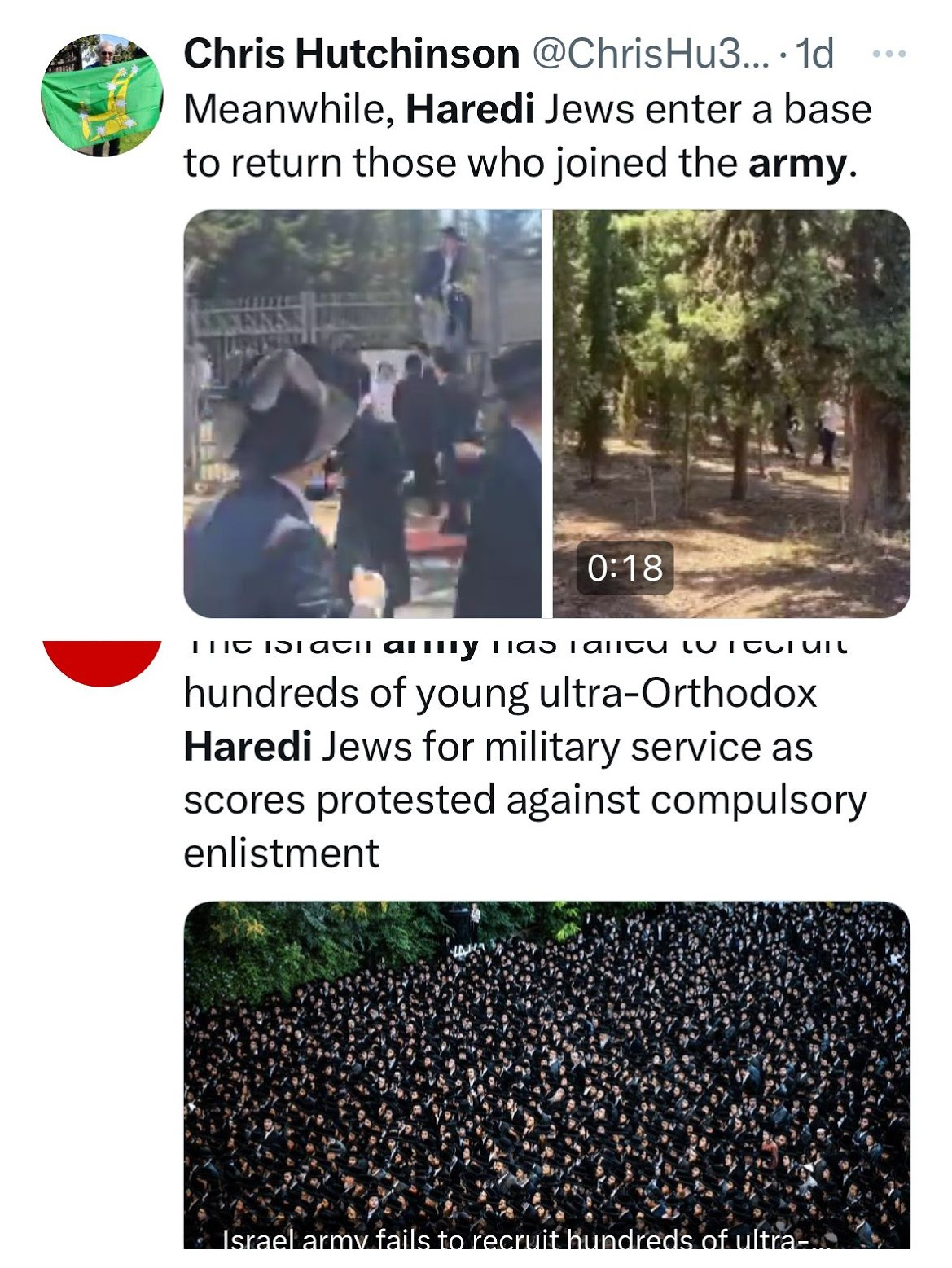Israel at War - Day 308
1. Tensions Rise as Iran and Hezbollah Plan Retaliationn
Following the assassinations of Hezbollah’s Leader senior military commander, Fuad Shukr in Lebanon and Hamas’ polite bureau chief Ismail Haniyeh in Teheran, Hezbollah and Iran both vowed to avenge the killings. The timing and scope of the retaliations by Iran and Hezbollah remain unknown. "Our retaliation for the assassination of our commander is inevitably coming, and it will be impactful and strong. We may choose to retaliate in cooperation with other resistance powers in Iran and Yemen or separately," said Hezbollah Secretary General Nasrallah, in a speech marking one week after Shukr’s assassination. Iranian Acting Foreign Minister Ali Bagheri Kani said earlier this week that its country’s response to Haniyeh’s assassination will take place "at the right time and in the appropriate shape,"
Meanwhile, the U.S., France, and several Arab countries, including Jordan, Egypt, Saudi Arabia, and Qatar are urging Iran, via diplomatic channels, to show restraint and refrain from retaliation that will lead to a regional conflict. U.S. Secretary of State Antony Blinken said that the United States has communicated to Iran and Israel that there is a consensus in the Middle East that conflict must not escalate. Iranian state media reported that in a call with French President Emmanuel Macron, Iranian President Masoud Pezeshkian said that if the U.S. and Western countries are truly seeking to prevent large-scale regional conflict, they must force Israel to stop the "genocide" in Gaza and reach a ceasefire agreement with Hamas. The French media, quoting the Elysee Palace, reported that Macron stressed in the call that Iran must call on the "destabilizing players it supports" to exercise the utmost restraint to avoid an escalating conflagration.
In response to the threats made by Iran and Hezbollah and the atmosphere of tense expectation of the inevitable, Defense Minister Yoav Gallant said: "there is a psychological attempt by the enemy to sow fear and instill terror," adding that "we are working to give the public sufficient warning" ahead of a possible attack, "and until then allow them to continue a normal lifestyle." IDF Chief of Staff Herzl Halevi said earlier this week that the IDF is "at peak readiness" and will know how to attack quickly "anywhere in Lebanon, anywhere in Gaza, anywhere in the Middle East – above ground and below ground." Also, the media reported that the U.S. has sent additional military forces to the region, in preparation for an Iranian attack on Israel.
2. Dramatic Escalation In the Violent Military Conflict With Hizbollah, and Deterioration In Southern Israel
At least 18 people were injured, two critically, from an attack drone that was targeted towards northern Israel, near Nahariya. While Israel is waiting for Hizbollah’s retaliation after the targeted killing of its chief of staff, Hizbollah continues to bomb targets in Israel, focusing mainly on military bases, but also causing civilian casualties, destroying many houses, and igniting brush fires all over northern Israel. Israel has tried not to escalate the situation and prevent deterioration to a full-blown regional war. Israel is under pressure from the American administration to hold their attacks and keep everything under control.
In the south, the situation has also deteriorated. Last week there were multiple red alert situations that forced people to take shelter. One of the main targets of the war in Gaza was to lift the security threat from the communities on the border with Gaza. Unfortunately that has not happened. Despite the magnitude of the destruction in Gaza, the number of Hamas fighters killed, and rocket launchers destroyed, Hamas still manages to threaten the residents of southern Israel and shoot rockets toward Israel. The Israeli army has failed so far to eliminate Hamas’ operative abilities.
Meanwhile, Hamas announced that Yahiye Sinwar, the chief military operator of Hamas in Gaza, will replace Ismail Haniyeh, who was assassinated in Tehran, as the head of the Hamas Political Bureau.
3. International Airlines Halt Flights to and From Israel
Due to the tense security situation in the Middle East in general, and in Israel in particular, almost all international airlines have canceled their flights to Israel. That means that only Israeli airlines are operating. This is not the first time that international airlines have decided to halt commercial flights to Israel. This was the situation right after the October 7th attack, primarily after the beginning of the ground operation in Gaza. Missiles from Gaza, and/or from Lebanon, may interfere with flying to and from Israel. Flight paths for landing and take off at Ben Gurion airport have also been affected. Pilots are also notified that GPS may not be operable due to IDF jamming of the GPS signal.
The outcome of the decision is that the local airlines have raised their prices according to the new market demands, and prices are skyrocketing. It also means that many Israelis are not able to travel out of the country during the summer vacation, and Israelis who are already abroad are stuck with no flights to return.
On April 14th, when Iran carried out a retaliatory operation against Israel, and sent tens of missiles and attack drones towards Israel, all international airlines also canceled their flights. Flight crews have refused to travel to Israel and refuse to spent the night in a country involved in a live war on three fronts.
4. Palestinian Prisoners Held in Israel Subject to Torture
The human rights organization, B’Tselem, which monitors the human rights of the Palestinians in the West Bank and Gaza, published a report that reveals that many Palestinians who were taken into custody in Israel during the war in Gaza, and during small military operations in the West Bank, are being held in inhumane conditions. They are often handcuffed fora whole day, they are not allowed to see lawyers for a long period of time, they don’t have minimal living conditions as defined by the prison authorities. According to the prison authorities there are 9,881 Palestinian prisoners, 3,432 of them are administrative detainees who are kept in prison without a trial, and 1,584 who are defined as unlawful combatants, also with no legal proceedings or trials. B’Tselem obtained testimonies from 55 Palestinians who were kept in prison facilities in Israel, most of them were released without charges. According to the report, at least 60 prisoners have died in captivity since the beginning of the war, 48 of them are from Gaza.
Right now there are five Israelis under investigation for the torture of a Palestinian from Gaza who was allegedly brutally assaulted by Israeli soldiers. This allegedly happened at the temporary prison facility Sde Teiman. The Israeli High Court of Justice heard a petition from human rights organization against the conditions at Sde Teiman. Right-wing supporters tried to protest in court against the argument that Palestinian prisoners are entitled to basic conditions while held in Israeli prison, and kept shouting: “Who takes care of our hostages in Gaza and what kind of conditions are they held under?”.
5. Haredi Enlistment Saga Reaches Another Boiling Point
The IDF reported that it issued 1,000 orders to appear this week to young Haredi men to report to the IDF enlistment office in Tel Hashomer, near Tel Aviv. This is in accordance with a High Court of Justice order of June 2024, that the state must enlist Haredi men, in the absence of a legal framework that enables the continuation of their exemption from compulsory military service.
While less than 5% of those who received the orders showed up to enlist, hundreds of Haredi men demonstrated outside the conscription office, dozens of them later stormed the military compound, and clashed with police officers and journalists who were at the scene. At least nine Haredi protestors were detained during the riots.
After security forces, who were outnumbered by the protestors, removed the rioters from the site, the IDF issued a statement, harshly condemning their breaking into the Tel Hashomer base, saying it is an illegal action and a serious offense. They further added that “the IDF condemns the violent behavior and insists that justice be meted out to the perpetrators. Recruiting ultra-Orthodox soldiers is an operational necessity that is being implemented in accordance with the law, and we are determined to continue to promote it”.
Haredi conscription, especially in times of war, is a matter of bitter public controversy. While the IDF insists that enlisting Haredi young men to service is critical, the overwhelming majority of Haredi religious and political leaders are vehemently opposed. Some of them cite the perils of co-ed service alongside women soldiers a major obstacle.
The issue of Haredi conscription was also at the heart of a conflict between the Attorney General’s office and Cabinet Secretary Fuchs, with the former claiming, in a public letter addressed to PM Netanyahu, that the government’s decisions and actions on this matter and others were a breach of authority. This, after Secretary Fuchs issued a legal brief stipulating that the IDF may only send orders to appear to working young Haredi men, but not those who study in Yeshivot, institutions of higher religious education.
To our readers: Please note that we embed links to further details/articles behind the summaries for each item. You can see the links by their blue color and, if you are interested in further details, you can click on the link to access the relevant article/s.

